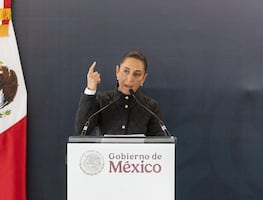Más Información

“Vamos a dar apoyo a los pequeños agricultores por sequía en Sonora”; Claudia Sheinbaum instruye a Berdegué

Derrota de México en disputa por maíz transgénico contra EU; estos son los argumentos de Sheinbaum y AMLO para prohibirlo

Óscar Rentería Schazarino, ha operado contra CJNG, Viagras y Templarios; es el nuevo secretario de Seguridad en Sinaloa

Claudia Sheinbaum pide respeto para Maru Campos; gobernadora anuncia acuerdo para transporte público

Claudia Sheinbaum anuncia los Centros de Cuidado Infantil en Chihuahua; inaugura hospital en Ciudad Juárez
Insecurity
and violence in Mexico are two scourges which have no end. On the contrary, in recent years they have gotten worse and have taken the lives of thousands of Mexican citizens. With the hold corruption networks have in Government bodies, organized crime remains entrenched there, despite the efforts of several administrations to weaken it and decrease its negative impacts.
Given this reality, the national leader of the left National Regeneration Party ( MORENA ), Andrés Manuel López Obrador , announced he wouldn’t rule out the possibility of offering amnesty to the leaders of criminal groups in order to ensure the peace of the country. While the current strategy against drug trafficking – launched 10 years ago – hasn't offered the expected results and deserves to be revised, forgiving those who have inflicted violence upon the Mexican society shouldn't be an option.
According to experts on these issues, agreed truces between Governments and drug lords – which have taken place in countries like Colombia or El Salvador – have positive aspects yet they often conclude on the mid-term with increased violence levels . That is, institutional corruption behind organized crime is finally exposed, yet in the end, none of these issues is resolved.
The Mexican law enforcement system is another element we have to consider for a proposal with these characteristics. The weakness of this instrument, in addition to the corruption networks feeding on crime, turn an eventual amnesty into a potential high-impact problem. Who would be pardoned and under which criteria?
There are several regions in the country where rule of law doesn't exist. In these places, Law is decreed by organized crime, and democracy, accountability, legality, and transparency are only vague concepts which cannot compete with the brutal reality being forced at gunpoint by criminals. Yet this isn't the biggest challenge.
The cultural permeation of organized crime in wide areas of our national territory makes giving amnesty to those who disturb our social peace unattainable. It's impossible this proposal can work in places where criminals are worshiped as role models for younger generations.
Organized crime has cultural and institutional roots; it has flourished within a society that has seen violence and Government corruption as commonplace phenomena. Amnesty to drug lords is, perhaps, the simplest solution given the complexity of the case scenario of violence. Solving a problem of this magnitude takes time, patients, and goal clarity. To find a solution for all within the rule of law, this is what we must work on.
am





